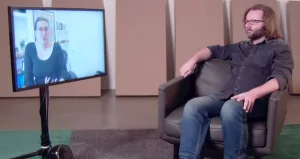Fresh from the Digital Economies Lab, Artwork_Local404 is an effort to introduce organized labour to the creative landscape. In this chat, Tim Maughan shares his thoughts on digital infrastructure, the possibilities for actualizing equity through solidarity, and the role Artwork_Local404 could take in mobilizing collective action. Drawing upon his experience as a journalist and author, Maughan describes the reductive nature of journalism and the limitless breath of fiction; moreover, Maughan addresses the nexus where fiction and non-fiction merge into the powerful polemic of “what if?!” That is the essence of art and that is the hope that inspires the fight for a better future. Not only does Maughan share his views on the pitfalls the project faces by repurposing digital tools, but the project’s great propensity for powerful change if we just modified our thinking around the concepts of community, the state, and digital infrastructure. Furthermore, Maughan warns of the dangers of othering the state and suggests, in turn, holding ourselves accountable to the fact that we are the state. Rather than distancing the creative landscape from the state for fear of falling into the capitalist fold, we should disrupt capitalism by wielding the organized power of the state and regulate digital infrastructure. Maughan provides an example he and his wife frequently ponders: what if we broke up Twitter and gave it to libraries to run, like a mesh network of Twitters? Packed with the woes of digital burnout, “commitment creep,” and the dystopian realities induced by unregulated capitalism, this conversation confronts the upward and downward trajectories of creating real change. Join us as we discuss the impacts of digital labour, withholding labour, and creative solidarity with one of the creators of Artwork_Local404.
PREPARE FOR THE NEXT DAY OF ACTION HERE:
KEEPING UP WITH TIM MAUGHAN:
Artwork_Local404 COLLABORATORS:
Read More by Maughan Here:
Ghost Hardware: Three Infinite Detail Stories
Yiwu: The Chinese city where Christmas is made and sold
Special Economic Zone. Fiction from the supply chain | by Tim Maughan | Futures Exchange
Expand your thinking on Maughan’s ‘Commitment Creep’:
Feature creep, what is it and how it affects your customers
Tim Hwang on the Imminent Collapse of the Attention Economy:
One Weird Trick for Destroying the Digital Economy
Reclaim Social Networking here:
Mastodon: Giving social networking back to you
Ask yourself, “What is activism?”:
What is Digital Labour?
Produced by the Artengine Stream Team:
Mikke Gordon aka Seiiizi https://twitter.com/s3iiizi
Ryan Stec
Kimberly Sunstrum https://www.kmbrlysnstrm.com/
Editorial Assistant
Erin Galt
Production Design Consultation
Leslie Marshall/MAVNetwork http://mavnetwork.com/
Post-Production Support: Chris Ikonomopoulos
DEL Theme Music by Mikki Gordon aka Seiiizi
Artengine’s Digital Economies Lab brought together a diverse group of artists, designers and other creatives to rethink the infrastructure of cultural production in the 21st century.
Funding for the Digital Economies Lab was received through the Canada Council for the Arts Digital Strategies Fund.
"That’s not the state to me, the state is us. If something is owned by the state, it means it’s owned by us."

Dames Making Games (DMG) founder Izzie Colpitts-Campbell speaks with us about her art and design practice and how her role as a community organizer influenced her contributions to the DEL. In this conversation we discuss her new DMG project Damage Labs, similarities between game design and community organizing, and how artist solidarity can be provoked digitally.